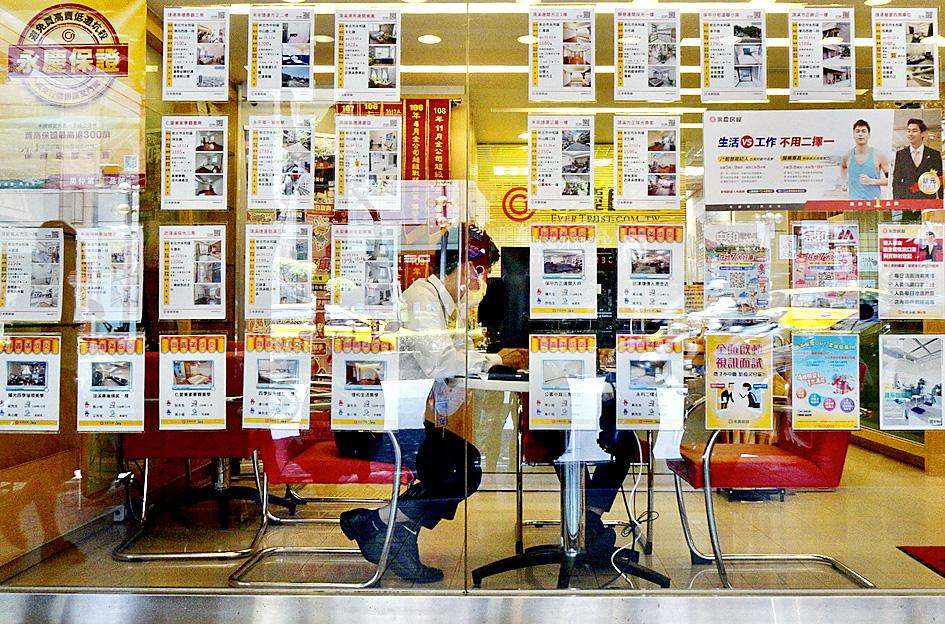Most Taiwanese companies remain positive about the property market and plan to raise their stakes in it in the coming 12 months, a survey released yesterday by Colliers International Taiwan (高力國際) showed.
“Eighty-five percent of respondents held positive views, although most put off investment amid the virus outbreak,” the local branch of the Canadian company said.
Sixty-six percent said they intended to increase their stake in the market and 80 percent believed property prices would remain stable, it added.

Photo: Peter Lo, Taipei Times
Colliers Taiwan surveyed domestic developers, life insurance companies, asset management companies, hotels and manufacturers, as well as influential families and individuals.
Plots of land topped the list for potential investments, followed by office spaces with stable rent incomes and industrial factories, the survey said.
Rent rates are generally expected to increase modestly in the next two years, but a severe lack of supply in popular locations could slow the pace of transactions, it said.
The COVID-19 pandemic is reshaping people’s lifestyles and giving birth to a stay-at-home economy highlighted by online shopping and remote working, Colliers Taiwan said.
The trend has been fueling demand for warehousing and logistics services, making related properties attractive investment targets, the consultancy said.
Taiwan’s low birthrate and aging population are lending support to investments in retirement housing and urban renewal projects, it said.
Interest in retail spaces and hotel buildings has taken a back seat as the sectors have been hit by border controls and movement restrictions during the COVID-19 pandemic, it said.
Developers and life insurance companies are the most avid investors and would take action after the COVID-19 crisis is over, Colliers Taiwan said.
Interest rate hikes and credit controls could affect investment decisions, it added.
The central bank last week left interest rates unchanged at its quarterly board meeting.
Monetary authorities might leave things unchanged for quite a while in the absence of major inflation risks, it said.

STILL HOPEFUL: Delayed payment of NT$5.35 billion from an Indian server client sent its earnings plunging last year, but the firm expects a gradual pickup ahead Asustek Computer Inc (華碩), the world’s No. 5 PC vendor, yesterday reported an 87 percent slump in net profit for last year, dragged by a massive overdue payment from an Indian cloud service provider. The Indian customer has delayed payment totaling NT$5.35 billion (US$162.7 million), Asustek chief financial officer Nick Wu (吳長榮) told an online earnings conference. Asustek shipped servers to India between April and June last year. The customer told Asustek that it is launching multiple fundraising projects and expected to repay the debt in the short term, Wu said. The Indian customer accounted for less than 10 percent to Asustek’s

‘DECENT RESULTS’: The company said it is confident thanks to an improving world economy and uptakes in new wireless and AI technologies, despite US uncertainty Pegatron Corp (和碩) yesterday said it plans to build a new server manufacturing factory in the US this year to address US President Donald Trump’s new tariff policy. That would be the second server production base for Pegatron in addition to the existing facilities in Taoyuan, the iPhone assembler said. Servers are one of the new businesses Pegatron has explored in recent years to develop a more balanced product lineup. “We aim to provide our services from a location in the vicinity of our customers,” Pegatron president and chief executive officer Gary Cheng (鄭光治) told an online earnings conference yesterday. “We

LEAK SOURCE? There would be concern over the possibility of tech leaks if TSMC were to form a joint venture to operate Intel’s factories, an analyst said Taiwan Semiconductor Manufacturing Co (TSMC, 台積電) yesterday stayed mum after a report said that the chipmaker has pitched chip designers Nvidia Corp, Advanced Micro Devices Inc and Broadcom Inc about taking a stake in a joint venture to operate Intel Corp’s factories. Industry sources told the Central News Agency (CNA) that the possibility of TSMC proposing to operate Intel’s wafer fabs is low, as the Taiwanese chipmaker has always focused on its core business. There is also concern over possible technology leaks if TSMC were to form a joint venture to operate Intel’s factories, Concord Securities Co (康和證券) analyst Kerry Huang (黃志祺)

It was late morning and steam was rising from water tanks atop the colorful, but opaque-windowed, “soapland” sex parlors in a historic Tokyo red-light district. Walking through the narrow streets, camera in hand, was Beniko — a former sex worker who is trying to capture the spirit of the area once known as Yoshiwara through photography. “People often talk about this neighborhood having a ‘bad history,’” said Beniko, who goes by her nickname. “But the truth is that through the years people have lived here, made a life here, sometimes struggled to survive. I want to share that reality.” In its mid-17th to